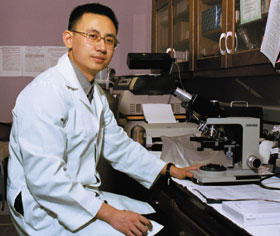

A publication of The Graduate School, University of North Carolina at Chapel Hill
Archives Spring 2001
Home | Back issues | About us | Email your feedback | The Graduate School | UNC-Chapel Hill | Make a gift
 A
Ge n e De t e c t i v e
A
Ge n e De t e c t i v e
Linking Nutrition to Brain Development
 |
| Photo by Rich Fowler |
Dr.
Jiannan Song became a physician so he could take care of sick people.
But as he approached his sixth year of medical school at China Medical
University in Tianjin, China, Song realized he could do even more for
his patients and the field of medicine.
“I think preventing sickness is much more important than treating it,” said Song, who is now completing his second year of doctoral studies in nutrition at Carolina, with help from a fellowship in the prestigious Royster Society of Fellows.
Song said his goal is to do research that could help stop the progression of disease or even prevent certain illnesses from occurring at all.
“People who have good nutrition can recover from illness more quickly than patients with unhealthy diets,” Song said. “And I believe nutrition is extremely important for preventing certain diseases.”
Song studies a gene called
ApoE, which he thinks is responsible for delivering choline to human tissues.
Choline, which is found in many foods and highest in eggs and soybean
products, is essential for proper brain development, especially during
gestation when organ growth is quickest, according to the National Academy
of Sciences.
Rats and mice that don’t
get enough choline during gestation seem to be less intelligent and have
less memory capacity than rats and mice that have diets high in choline.
Simply put: more choline, smarter babies — less choline, less intelligent
babies.
Studies have shown that disabling
the ApoE gene also makes mice less intelligent, which is why Song believes
ApoE plays a role in choline delivery. If he’s right, Song’s
research could be the groundwork for designing an improved diet for pregnant
women and their children.
Song takes great pride in his
work because it’s on the cutting edge of medical research. But more
importantly, he is grateful for the chance to realize a lifelong goal.
For Song’s parents, graduate
study was an impossible dream. In the late 1960s, the communist government
in China outlawed almost all higher education for about a decade. As a
result, Song’s parents never let him forget that graduate study is
vital for personal development and success.
While Song strives to achieve
his goals, the UNC-Chapel Hill graduate school carries on its tradition
of academic excellence and innovation by recruiting bright students like
Song.
“We seek to bring the
best and brightest to Chapel Hill,” said Dr. Steven Zeisel, professor
and chairman of the nutrition department at Carolina. “Students like
Jiannan bring great resources to the University, and they often become
the next generation of professors.”
Song intends to live up to
the high expectations of his peers and advisors. He plans to one day become
a professor in a teaching hospital and to continue his research in nutrition
and disease prevention.
In the meantime, Song’s
life couldn’t be better. Unlike many international scholars who must
pursue their dreams alone, Song didn’t have to choose between love
and work. His wife, Xiaonan, who is also a physician, transferred to Carolina
from the University of Kentucky last summer so they could work together
in the same lab.
In addition to class and laboratory
analyses, Song must check on his mice daily. He sometimes gets so busy
with his mice that he has to prepare a whole week of meals for himself
on Sunday.
“My mice get private housing
and full board service, but I have to cook for myself when I can find
the time.” Song said. “But every couple of weeks, I treat my
wife and myself to Chinese food to cure homesickness.”
- Tania E. Zeigler
© 2002, The Graduate School, The University of
North Carolina at Chapel Hill
All text and images are property of The Graduate School
at the University of North Carolina-Chapel Hill. Contact Sandra Hoeflich
at shoeflic@email.unc.edu
to request permission for reproduction.
Contact Alexandra Obregon at aobregon@email.unc.edu if you have technical problems with this Web site.